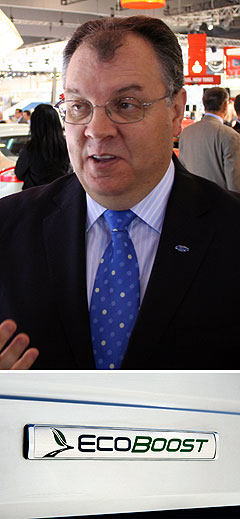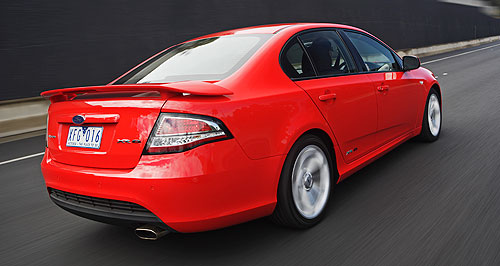Future models - Ford - FalconFord to make call on next Falcon in 2011Caption: The FG Falcon will be fitted with a four-cylinder in 2011, around the same time Ford is deciding the car’s future. Current Falcon to soldier on until 2015 while Ford mulls its future11 Aug 2009 FORD Australia will not make a decision on the next Falcon until 2011. Company president Marin Burela revealed the new deadline last week and also confirmed the current rear-drive platform would continue on in its current form until 2015. Asked about decisions being made about the next Falcon, Mr Burela said it was too early to lock in any direction for that car. “We are very fortunate – we don’t have to make that call yet,” he said. “The natural time for the Falcon replacement would occur at the end of 2014, early 2015 – that is the typical cycle.” Ford Australia will not need to make any decisions until after the new four-cylinder EcoBoost engine is introduced in the Falcon in 2011. “We would then typically be in a position when we would need to make a decision on powertrains, platform and technologies by the end of 2011,” Mr Burela said. “So between now and then, we have a lot of time to work with our global product development team and also the local team here to ensure that we do the right thing.” Ford Motor Company president Alan Mulally told GoAuto a year ago that next Falcon would share a platform with other large front-drive, rear-drive or all-wheel-drive Ford models in the US.  Left: Ford Australia president Marin Burela. Below: Ford's EcoBoost branding. Left: Ford Australia president Marin Burela. Below: Ford's EcoBoost branding.The arrival date of the new Falcon has not been clear, but last month’s announcement that the car would be fitted with a four-cylinder turbo Ecoboost engine from 2011 as a part of a $230 million investment indicated Ford in Detroit was backing the locally-made rear-drive Falcon for some time to come. The Falcon will be the first rear-drive car to be fitted with the turbo four-cylinder engine, which will be imported. The current Falcon platform can be traced to the BA Falcon of 2002, but was upgraded with new double-wishbone front suspension for the FG model launched last year. Mr Burela said it was more than good enough to last until 2015. “All of our insights in terms of the vehicle’s acceptance and the plans that we have for it as we progress through this cycle give us absolute confidence that the freshness of the car, the acceptability of the car, the technology levels of the car and now with the additional powertrain actions that we are putting in there will give it the absolute life that it needs to take it through until the end of that cycle,” he said. “That rear-wheel drive platform is a very, very good platform. There is no compelling reason to go out there to make any decisions or changes.” While the future of the platform is locked in until 2015, it is not yet clear if the locally-made in-line six cylinder engine will also make it through to that date. Last November, Ford Australia announced it would not close the Geelong plant that produces the 4.0-litre in-line six and was investing $21 million on the factory and upgrading the engine to meet the Euro IV emissions standard that comes into place next July. The federal government is yet to set a timeframe for the introduction of the Euro V emissions standard which would form the next big hurdle for the local engine. The potential popularity of the imported EcoBoost four-cylinder engine could also hit demand for the Australian I6 and affect its viability if volumes were to drop significantly. As for the next Falcon and what form it will take, that will most likely depend on what the US market decides. Mr Burela said market research by Ford Australia found there was still significant demand for rear-wheel drive, although all-wheel drive was also generating interest. “What they have said to us is that front-wheel drive is OK for certain types of cars,” he said. “They have said to us that rear-wheel drive is great, but you know what they have also said to us that all-wheel drive is fantastic as well.” Mr Burela said Ford was getting “interesting messages in terms of what type of drivetrain or what application by particular customer groups”. “Sporting enthusiasts are particularly keen on rear-wheel drive, the normal private buyers, fleet and government are not all that particular, they are comfortable that the vehicle could be either/or, and we are kind of sensing that one of the very desirable preferences is that of an all-wheel drive, people are telling us that is a good thing.”  Read more28th of July 2009  Cast-off ‘premium’ diesel for TerritoryFord Territory’s new diesel ‘best in class’, despite being pensioned off in Europe27th of July 2009  Ford Falcon EcoBoostedFalcon to plug in to global Ford plan with direct-injection 2.0-litre EcoBoostAll future models Alfa Romeo Alfa Romeo Abarth Abarth Audi Audi Aston Martin Aston Martin BMW BMW Bentley Bentley Chrysler Chrysler Chevrolet Chevrolet Dodge Dodge Citroen Citroen Ferrari Ferrari DS DS Ford Ford Fiat Fiat FPV FPV Foton Foton Haval Haval Great Wall Great Wall Honda Honda Holden Holden Hyundai Hyundai HSV HSV Isuzu Isuzu Infiniti Infiniti Jeep Jeep Jaguar Jaguar Lamborghini Lamborghini Kia Kia Lexus Lexus Land Rover Land Rover Mazda Mazda Maserati Maserati Mercedes-Benz Mercedes-Benz McLaren McLaren Mini Mini Nissan Nissan Mitsubishi Mitsubishi Peugeot Peugeot Opel Opel Proton Proton Porsche Porsche Renault Renault Ram Ram Saab Saab Rolls-Royce Rolls-Royce Smart Smart Skoda Skoda Subaru Subaru SsangYong SsangYong Tesla Tesla Suzuki Suzuki Toyota Toyota Volvo VolvoMotor industry news |
Click to shareFord modelsResearch Ford All future models Alfa Romeo Alfa Romeo Abarth Abarth Audi Audi Aston Martin Aston Martin BMW BMW Bentley Bentley Chrysler Chrysler Chevrolet Chevrolet Dodge Dodge Citroen Citroen Ferrari Ferrari DS DS Ford Ford Fiat Fiat FPV FPV Foton Foton Haval Haval Great Wall Great Wall Honda Honda Holden Holden Hyundai Hyundai HSV HSV Isuzu Isuzu Infiniti Infiniti Jeep Jeep Jaguar Jaguar Lamborghini Lamborghini Kia Kia Lexus Lexus Land Rover Land Rover Mazda Mazda Maserati Maserati Mercedes-Benz Mercedes-Benz McLaren McLaren Mini Mini Nissan Nissan Mitsubishi Mitsubishi Peugeot Peugeot Opel Opel Proton Proton Porsche Porsche Renault Renault Ram Ram Saab Saab Rolls-Royce Rolls-Royce Smart Smart Skoda Skoda Subaru Subaru SsangYong SsangYong Tesla Tesla Suzuki Suzuki Toyota Toyota Volvo VolvoMotor industry news |
















Facebook Twitter Instagram